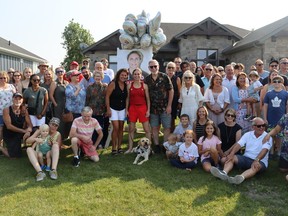
Sarnia Paralympian Priscilla Gagne was welcomed home Saturday by family and friends.
Advertisement 2
Article content
As the vehicle she was riding in drove up, they gathered on the front lawn of the home of her mother, Shirley Beauregard-Crowe, while a favorite song of Gagne’s played on speaker outside.
“It’s so good to have my family and friends. . . everyone’s here,” Gagne said.
The 38-year-old blind judoka, who won Silver three years ago in Tokyo, tied for fifth place at the recent Paris Games. It was her third Paralympics and, she said, the completion of her competitive career.
Gagne, who has retinitis pigmentosa, was born in Granby, Que., and moved with her family to Sarnia when she was very young.
She attended King George VI Public School and spent her first two years of high school at the W. Ross Macdonald School for the Blind in Brantford, and then graduated from St. Patrick’s Catholic High School back home in Sarnia.
Advertisement 3
Article content
Gagne attended Bible college in Oklahoma and graduated with a diploma in addictions counseling and community services from Everest College in Barrie.
Gagne competed in wrestling before switching to judo. For nine years now, she has been living and training in Montreal.
Among those gathered Saturday were two of her early coaches, including Bob Sing, her first judo sensei at the local YMCA.
“It was an honor and privilege to teach her,” Sing said.
Terry Maxwell, a retired teacher at St. Pat’s, was Gagne’s track coach in high school.
“She was a good kid, worked hard and ran well,” he said. “She gave it her best.”

Beauregard-Crowe said her daughter’s Olympic dream began at the age of 10 while the family was watching the 1996 Atlanta Games. “She said she wanted to be in the Olympics from then on.”
Advertisement 4
Article content
When Gagne arrived on Saturday, the song playing was Celine Dion’s Power of the Dream.
Dion was a favorite singer of Gagne’s and the song was performed at the opening of the 1996 Olympics.
“That young lady never ceases to impress me,” Beauregard-Crowe said.
“I’m over the moon with her determination, her perseverance, her dedication that she can do this.”
While “I would have raised her in bubble wrap if I could of,” Gagne was always active growing up, often with the encouragement of her older brother, Beauregard-Crowe said.
“He had her doing skateboarding. That’s how she broke her arm, one time.”
Beauregard-Crowe said her daughter is always eager to show others what is possible, “especially others with any kind of disability.”
Advertisement 5
Article content
She and Gagne’s father, JC Gagne, were in Paris to cheer their daughter on, including the bronze medal match where decisions by officials generated loud jeers from the sold-out crowd, Beauregard-Crowe said.
“When she lost the bronze, I was devastated,” Beauregard-Crowe said.
But she said her daughter said she was happy for Argentina’s Paula Karina Gomez who won bronze, adding “maybe she was the only one that really needed it this time.”
“You never stop learning from your kids,” Beauregard-Crowe said.
“I have peace with my career,” Gagne said. “I know how I did. My life doesn’t end on that stage, so I’m excited for what’s happening now” and what’s next.
Gagne plans to write, run clinics for visually impaired and sighted athletes, and encourage others through public speaking.
“The first thing I’m looking forward to is being here with family,” she said.
Article content
